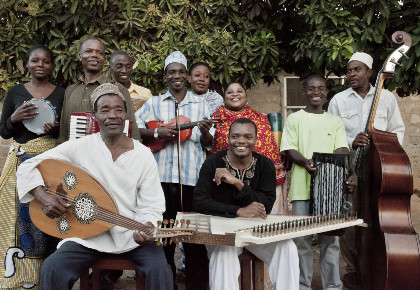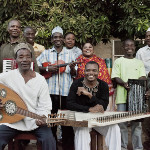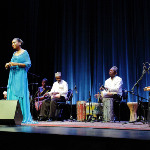- country:Tanzania
- region:East Africa
- style(s):Taarab
- label:Buda Musique
- type:Chamber Orchestra
- gender:male, female
- instrumentation:instrumental, vocal, percussion, string
- artist posted by:Jahazi Media
Line up
- Daud Shadhil (bass)
- Foum Faki (ngoma, dumbak, bongos)
- Makame Faki (oud, vocals)
- Malitina Hassan (chorus, dance)
- Mohamed Hassan (accordion)
- Rajab Suleiman (qanun)
- Rukia Juma (chorus, dance)
- Saada Nassor (vocals)
Links
Zanzibari qanun player Rajab Suleiman is probably best known as a member and featured soloist of the Culture Musical Club, which together with Ikhwani Safaa established the legacy of the Islands’ large taarab orchestras and social clubs. A natural musician and untiring in his quest for musical knowledge Rajab has moved beyond the frontiers of the taarab of old, becoming a virtuoso on this difficult instrument and including playing techniques and repertoire from the classical Arabic and Turkish schools, and anything else from Bach to jazz, molded by his own Zanzibari and taarab music experience. Thus Rajab and Kithara also strive to infuse their repertoire with rhythms and melodies of local Zanzibari local ngoma drum/dance traditions like msewe, bomu, msondo etc.
Kithara was formed by Rajab and some other younger members of CMC as, so he says “new times demand new structures to advance artistic goals.” Feeling that their creativity was hindered by the traditional club structure they branched out on their own. Yet of course they try to further the club’s legacy and they have enlisted the help of singer, ‘ud player and composer Makame Faki, who is one of the doyens of Zanzibar taarab, and of star singer Rukia Ramadhani, to this day one of the most-in-demand singers in both traditional and modern taarab (Rukia is currently a featured member of the East African Melody and Zanzibar Stars Modern Taarab groups).
Makame Faki is himself also the leader of one of Zanzibar’s leading kidumbak ensembles, Sina Chuki. Kidumbak is taarab’s dance-focused little brother being played to this day at local wedding celebrations to make everyone dance and merry. Kidumbak takes its name from the two small drums (vidumbaki) that form the basis of the ensemble. The line-up is completed by the sanduku – a kind of tea-chest bass – cherewa (maracas) and vijiti (timing sticks beaten on a wooden stool). The melodic lead is provided by one or two violins as the singer weaves songs together in medley-like fashion. The kidumbak dance, performed by women exclusively, involves a sensuous movement of the hips, possibly bet alluded to as the down-home African ancestor of Oriental belly dance.




